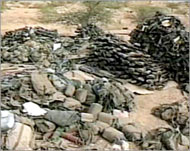UN fears new Ethiopia-Eritrea war
A senior UN official monitoring the tense Ethiopian-Eritrean border has said he fears a new war is possible after both sides moved troops and military hardware closer to their shared border in the past 10 days.

“This potentially volatile situation could lead to a renewed outbreak of war,” said Major General Rajender Singh, forces commander of UN Mission in Ethiopia and Eritrea (UNMEE) on Thursday.
“If not addressed, if we do not take measures, if the international community does not act, maybe the situation may deteriorate to a level where the worst can happen and that is war.”
On Wednesday, UN Secretary-General Kofi Annan expressed deep concern at reports Ethiopia and Eritrea were moving troops and military equipment closer to the buffer zone.
Annan urged the UN Security Council and member states “to take decisive steps to defuse the escalating tension,” according to a statement from his spokesman.
Annan’s special representative to Eritrea and Ethiopia, UNMEE head Legwaila Joseph Legwaila, told the reporters it was up to the Security Council to produce a solution, although this might be a tough task.
|
“This potentially volatile situation could lead to a renewed outbreak of war” Major General Rajender Singh, UNMEE Commander |
“The secretary general called for urgent action on the crisis we face, in other words the Security Council has its work cut out,” Legwaila said.
Ethiopian troops and tanks that were 40km from the demilitarized zone are now 20km away, said Singh, whose troops patrol a buffer zone set up after a 2 1/2-year border war that ended in 2000.
War threat
Western diplomats say the two countries have some 300,000
troops – including 200,000 on the Eritrean side – near the
buffer zone.
They said that Ethiopians are strengthening their defences and are moving troops and tanks because they believe that Eritrea has a new air defence system.
Both governments are at a greater risk of going to war now because they face rising internal opposition and conflict with a foreign country may enable them to rally their respective nations behind the political leadership, the diplomats said on the condition of anonymity.
 |
|
Some 70,000 people were |
At least three people were shot dead and around eight wounded in the Ethiopian capital on Thursday when police opened fire amid civil unrest on the third day of deadly street battles in the capital, hospital sources said.
The new deaths bring to at least 42 the number of people killed in similar circumstances since Tuesday in clashes between riot police and protesters over disputed election results in the Ethiopian capital, Addis Ababa.
The dispute
Ethiopia and Eritrea went to war over a border of scrubby plains and dusty villages in 1998, sending soldiers to die in World War One-style trench warfare.
The conflict, triggered mainly by a border dispute, killed an estimated 70,000 people.
Eritrea has been growing increasingly frustrated at the failure to implement a peace agreement with Ethiopia that was reached in December 2000.
In that agreement, both sides agreed to demarcate their border as decided by an independent commission. But when the commission made its ruling, deciding that the flashpoint town of Badme actually belonged to Eritrea, Ethiopia rejected the decision.
Diplomats say a new conflict would hurt the region once used as a base by al-Qaida and that continues to suffer drought and famine and the destabilising effect of anarchy in Somalia.